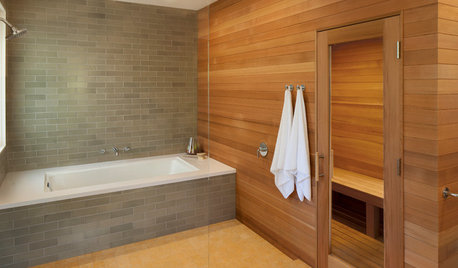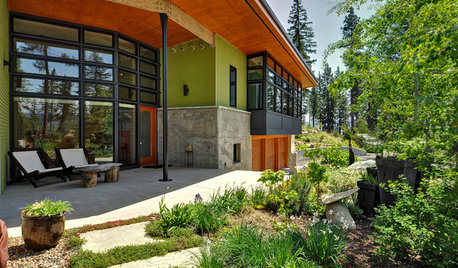Substantial Completion and Punch-List Qualifications?
K S
5 years ago
Featured Answer
Sort by:Oldest
Comments (16)
Related Discussions
GC as Ownerbuilder Consultant + Sample Contract
Comments (1)cut & paste or bookmark! Keep this handy!...See MoreWhy a Punch List?
Comments (5)At the time of "substantial completion" (when the house is essentially ready to be occupied) the "retainage" funds that have been withheld from the previous contract payments will be reduced and a final payment will be made after a list of outstanding work and correction of deficiencies is completed to the owner's satisfaction. The list is normally made by an architect who represents the owner and who understands the contract requirements and the important quality issues. When an owner is not represented by an architect they must do it themselves. If you are not in the construction industry it is a difficult task and you will miss things but hopefully the money saved by forgoing professional representation will offset the loss. A list of deficiencies prepared at the end of one year would not trigger a payment and is therefore not a punch list but a list of warranty claims. Each item would need to be reviewed and negotiated independently with the original builder. If some of these problems were detected earlier and are now worse or more difficult to repair you would need to be able to explain why you did not notify the builder sooner....See MoreThe perfect build followed by the punch list from h**l
Comments (16)I think that one thing you need to do is discuss the whole situation with a really good construction attorney. You don't have to let your builder know you've hired a lawyer or anything, but I think you need to understand exactly where you stand given your specific contract, signed change orders, and the new unsigned change orders. And I think a lawyer should read through any letter before you send it, just to make sure you're not accidentally obligating yourself to something that wouldn't otherwise be your responsibility. I wouldn't worry about the builder talking about you in an unflattering way. It sounds like he's pulled this same "pay me an extra 50k" stunt at the end of other jobs, so frankly his credibility isn't very good. If you haven't closed yet, I think you should also consider delaying closing until at least the larger problems (plumbing etc) are fixed, and holding back money to cover the rest. I also would worry about the photovoltaic array being left in the flood setback area - maybe it's no big deal, but it just seems like something that might come back to bite you when you go to sell the house. I actually like the idea of bringing your realtor friend along. It would be a good reminder to him that his actions will affect how other clients and potential clients view him, without you having to spell it out quite so bluntly. It sounds like you've been on top of the details during your build, and that will be a big asset to you now. Keep your head in any phone calls or meetings, and don't feel obligated to agree to anything on the spot. And hang in there!...See Morecontractor payment schedule?
Comments (12)Which, I am beginning to think from listening to other discussions, he might be needing your money to fund other things/projects. In essence, his clients are floating him loans. Interest-free at that, with a lot of risk attached. This could indicate financial problems, as snooby noted. At least try to renegotiate to protect yourself. If he won't, you need to make a choice how much risk you want to expose yourself to for this particular company. There was a seemingly sound company around here that bellied up, a near million in the hole. I'm sure their business partners and clients did not fare too well either. It does happen. This post was edited by snookums2 on Mon, Nov 17, 14 at 19:58...See MoreK S
5 years agoK S
5 years agoK S
5 years agoK S
5 years agolast modified: 5 years agoK S
5 years ago
Related Stories

REMODELING GUIDESHow to Survive the ‘Punch List’ Phase of Your Remodel
Here’s what to know about that end-of-remodel project phase that you can get involved in
Full Story
BATHROOM DESIGN18 Dream Items to Punch Up a Master-Bath Wish List
A designer shared features she'd love to include in her own bathroom remodel. Houzz readers responded with their top amenities. Take a look
Full Story
KITCHEN DESIGNNew This Week: 4 Ways to Punch Up a White Kitchen
Avoid the hospital look by introducing a bit of color, personality and contrast
Full Story
HOUZZ TOURSMy Houzz: Rising to the Renovation Challenge in Toronto
An eye for potential and substantial remodeling lead to a chic and comfortable home for a Canadian family
Full Story
WORKING WITH PROSConstruction Contracts: How to Understand What You Are Buying
Learn how plans, scope of work and specifications define the work to be completed
Full Story
BUDGETING YOUR PROJECTDesign Workshop: Is a Phased Construction Project Right for You?
Breaking up your remodel or custom home project has benefits and disadvantages. See if it’s right for you
Full Story
REMODELING GUIDESContractor Tips: What Your Contractor Really Means
Translate your contractor's lingo to get the communication on your home project right
Full Story
DECORATING GUIDES8 Open-Plan Mistakes — and How to Avoid Them
There’s much to love about relaxed open-living layouts, but they can be tricky to decorate. Get tips for making one work
Full Story
BUDGETING YOUR PROJECTConstruction Contracts: What Are General Conditions?
Here’s what you should know about these behind-the-scenes costs and why your contractor bills for them
Full Story
TRADITIONAL HOMESHouzz Tour: Country Comfort With a Touch of Chic
A neutral color palette with warm textiles and traditional furniture creates an elegant yet relaxed family home in the Cotswolds
Full Story








jellytoast